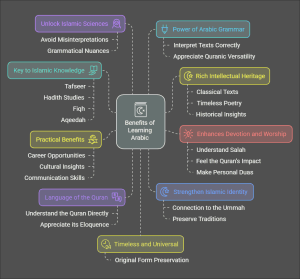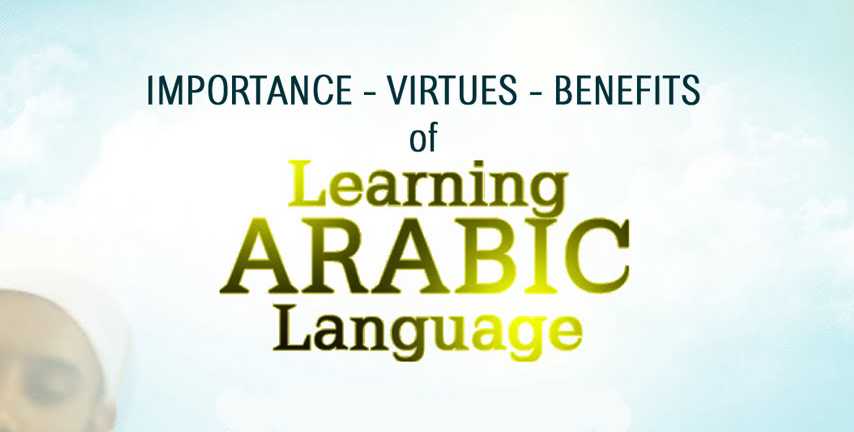Arabic is not just a language; it’s a connection to faith, culture, and a rich intellectual heritage. For Muslims, it is the sacred language of the Quran and the Sunnah, making it vital for understanding Islamic teachings in their truest form. Beyond religion, Arabic opens doors to a vast array of literature, science, and history, influencing countless cultures over centuries.
In this article, we explore the profound benefits of learning Arabic for both spiritual growth and intellectual enrichment.

1. The Language of the Quran
Allah, in His wisdom, chose Arabic as the language of the Quran. This alone underscores the significance of learning Arabic for Muslims. The Quran states:
“Indeed, We have sent it down as an Arabic Qur’an that you might understand.” (Surah Yusuf 12:2)
Arabic’s intricate structure and unparalleled eloquence make it the perfect vehicle to convey the depth and beauty of Allah’s message. Learning Arabic allows Muslims to:
- Understand the Quran Directly: Avoid reliance on translations, which can never fully capture the Quran’s essence.
- Appreciate its Eloquence: Grasp the stylistic and rhetorical brilliance of the Quran, something that is often lost in translation.
- Enhance Worship: Recite prayers and supplications with a deeper understanding and connection.
2. A Key to Islamic Knowledge
Arabic is essential for delving into Islamic sciences, which include:
- Tafseer: The interpretation of the Quran.
- Hadith Studies: Understanding the sayings of the Prophet Muhammad (peace be upon him).
- Fiqh (Jurisprudence): Deriving Islamic rulings directly from Quranic and Hadith sources.
- Aqeedah: Islamic theology and beliefs.
Learning Arabic equips students to explore these disciplines without intermediaries, unlocking the treasures of Islamic scholarship.
3. A Rich Intellectual Heritage
Arabic is the foundation of Islamic civilization’s incredible contributions to science, philosophy, mathematics, and literature. By learning Arabic, you gain access to:
- Classical Texts: Works by renowned scholars like Al-Ghazali, Ibn Sina, and Al-Farabi.
- Timeless Poetry and Literature: Arabic’s poetic nature makes it one of the richest languages in literary history.
- Historical Insights: Arabic chronicles provide unique perspectives on global events and cultures.
4. Strengthen Your Islamic Identity
Arabic is a unifying thread for Muslims worldwide. Learning it fosters a deeper connection to the Ummah (Muslim community) and helps preserve Islamic traditions. For parents, teaching their children Arabic is a way to ensure they stay connected to their roots and faith, no matter where they live.
5. Enhances Devotion and Worship
Knowing Arabic enriches your spiritual practices by allowing you to:
- Understand Salah (Prayer): Comprehend the words you recite in your daily prayers.
- Feel the Quran’s Impact: Experience the Quran’s full emotional and spiritual weight.
- Make Personal Duas: Speak to Allah in Arabic, the language of revelation, without needing translations.
6. Arabic is Timeless and Universal
For over 1,400 years, Arabic has remained remarkably unchanged, preserving the Quran’s original form. This stability ensures that modern learners can read the Quran and classical Islamic texts just as they were originally written.
7. Unlock the Mysteries of Islamic Sciences
Arabic plays a crucial role in understanding complex Islamic sciences that rely heavily on the language’s nuances. Misinterpretations often arise when texts are read in translation, making it essential for scholars and learners to study Arabic to avoid inaccuracies.
8. The Power of Arabic Grammar
Arabic grammar, or Nahw, is a science in itself. Mastery of grammar allows learners to:
- Interpret Texts Correctly: Avoid misunderstandings that can arise from grammatical errors.
- Appreciate Quranic Versatility: Witness how slight changes in phrasing can transform meanings.
9. Learning Arabic is a Religious Obligation for Some
Some scholars argue that learning Arabic is obligatory (fard kifayah) for Muslims, as it is essential for understanding the Quran and Sunnah. Umar ibn Al-Khattab (may Allah be pleased with him) said:
“Learn Arabic, for it is part of your religion.”
This statement highlights the importance of Arabic in understanding and practicing Islam fully.
10. The Practical Benefits of Arabic
Arabic is not only a spiritual language but also an important global language. Learning Arabic provides:
- Career Opportunities: Open doors in translation, teaching, and international business.
- Cultural Insights: Gain a deeper appreciation for the traditions and customs of the Arab world.
- Communication Skills: Connect with over 400 million Arabic speakers worldwide.
Start Your Arabic Learning Journey
Whether you are beginning your journey or looking to deepen your understanding, Arabic is a language that transforms how you experience your faith and the world. At The Quran Courses Academy, we offer:
- Expert Arabic Tutors: Learn from certified teachers with years of experience in Arabic and Quranic studies.
- Free Trial Classes: Start with three free trial lessons to experience our interactive and effective teaching methods.
- Customized Lessons: Tailored plans to meet your specific goals, whether for Quranic Arabic or conversational skills.
💻 Sign up today and unlock the benefits of learning Arabic!
FAQs About Learning Arabic
1. Why is Arabic important for Muslims?
Arabic is the language of the Quran and Sunnah, making it essential for understanding Islamic teachings and practicing worship meaningfully.
2. Can beginners learn Arabic online?
Yes, many online platforms, including The Quran Courses Academy, offer beginner-friendly courses to help students master Arabic step by step.
Get started with our Online Arabic Speaking Classes and Online Arabic Reading Classes.
3. How long does it take to learn Arabic?
The time required depends on your goals and dedication. Basic conversational skills may take a few months, while Quranic proficiency requires consistent effort over time.
4. Is Arabic difficult to learn?
While Arabic’s grammar and script can be challenging at first, consistent practice and guidance make it achievable for learners of all ages.
5. What tools are needed to learn Arabic online?
You’ll need a computer, tablet, or smartphone with a stable internet connection to access online lessons and resources.
6. Can children learn Arabic effectively online?
Absolutely! Interactive lessons designed for kids make learning Arabic engaging and enjoyable.
7. Why is Arabic grammar important?
Grammar allows you to understand the Quran’s subtleties, avoid misinterpretations, and appreciate the language’s beauty.
8. Do I need to know Arabic to read the Quran?
While you can recite the Quran without understanding Arabic, learning the language enhances your connection and understanding of its message.
Also Read: How to learn Arabic online for free



